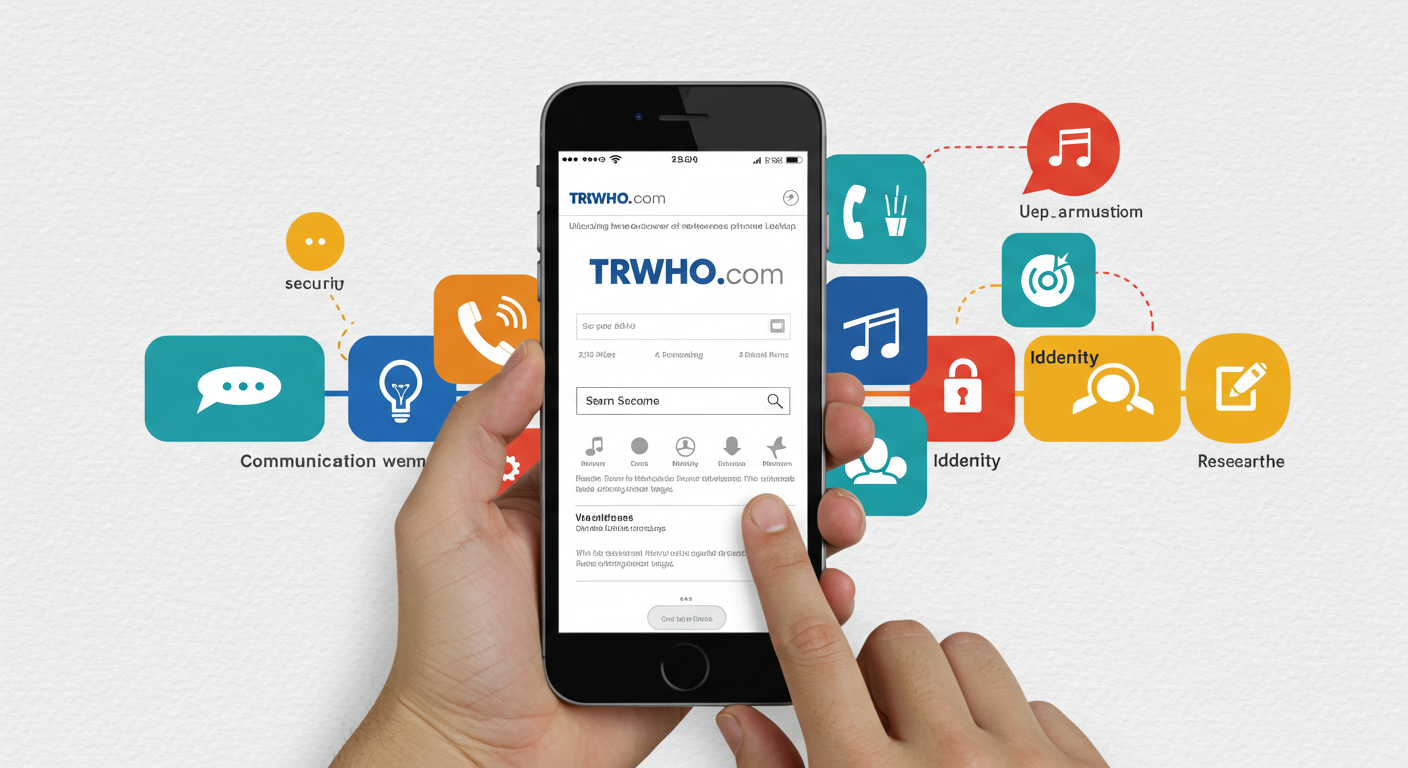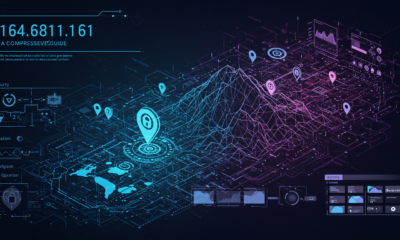Technology
TRWho.com: Unlocking the Power of Reverse Phone Lookup

In today’s digital age, receiving calls from unknown numbers has become a common yet frustrating experience. Whether it’s a potential scam, telemarketer, or a long-lost contact, the mystery behind unidentified numbers can leave anyone curious—or concerned. Enter TRWho.com, a cutting-edge reverse phone lookup platform designed to decode the secrets behind unknown callers. This article explores how works, its standout features, and why it’s an essential tool for personal safety and peace of mind.
What Is TRWho.com?
TRWho.com is a user-friendly, web-based reverse phone lookup service that empowers users to identify unknown callers instantly. By simply entering a phone number into its search bar, the platform scours public records, social media profiles, and proprietary databases to deliver detailed reports. These reports include the caller’s name, location, carrier information, and even potential spam alerts. Unlike many competitors, prioritizes accuracy, speed, and privacy, making it a go-to solution for millions of users.
Key Features of TRWho.com
1. Comprehensive Phone Number Reports
TRWho.com goes beyond basic caller identification. Its reports often include:
- Caller Name and Address: Uncover the identity and location of unknown numbers.
- Carrier Details: Determine whether the number is linked to a mobile, landline, or VoIP service.
- Spam Risk Assessment: Receive alerts if the number is flagged as spam or fraudulent.
- Social Media Links: Discover associated social media profiles for deeper insights.
2. Real-Time Data Updates
The platform’s databases are updated in real time, ensuring users access the most current information. This is critical for identifying new spam numbers or recent phone number reassignments.
3. Privacy-First Approach
TRWho.com adheres to strict data privacy guidelines. Searches are confidential, and the platform does not store or share user query data.
4. Multi-Device Accessibility
Whether you’re on a desktop, tablet, or smartphone, TRs responsive design ensures seamless functionality across all devices.
5. Affordable and Transparent Pricing
While many reverse lookup services hide behind subscription traps, TR offers flexible pay-per-report options and upfront pricing.
How to Use TRWho.com in 3 Simple Steps
- Visit TRWho.com: Navigate to the website using any browser.
- Enter the Phone Number: Input the full phone number (including area code) into the search bar.
- Review the Report: Within seconds, access a detailed breakdown of the caller’s information.
No sign-ups or downloads are required, making the process quick and hassle-free.
Why Choose TRWho.com Over Other Services?
The reverse phone lookup market is crowded, but TRWho.com stands out for several reasons:
- Accuracy: Leveraging advanced algorithms and verified data sources, TRWho minimizes false positives.
- Speed: Reports generate in seconds, saving users time.
- User Experience: The intuitive interface caters to both tech-savvy users and beginners.
- Cost-Effectiveness: Avoid monthly subscriptions—pay only for the reports you need.
Top Benefits of Using TRWho.com
1. Protect Yourself from Scams
With rising phone-based fraud, TRWho.com helps users screen potential scam calls. A quick search can reveal if a number is linked to phishing attempts or identity theft schemes.
2. Reconnect with Lost Contacts
Ever stumbled upon an old number in your contacts list? It can help verify if the number still belongs to a friend, family member, or colleague.
3. Screen Business Leads
Entrepreneurs and sales teams use TRWho.com to validate client numbers, reducing wasted outreach efforts.
4. Peace of Mind for Parents
Parents can identify unknown numbers contacting their children, ensuring their safety in an increasingly connected world.
TRWho.com vs. Traditional Directory Assistance
Unlike outdated directory assistance services, which only list landline numbers, TRWho.com covers mobile numbers, VoIP lines, and even unlisted numbers. Its digital-first approach ensures broader coverage and faster results.
Frequently Asked Questions (FAQs)
Q: Is TRWho.com legal to use?
A: Absolutely. TRWho.com aggregates publicly available data, complying with all privacy laws.
Q: Can I lookup international numbers?
A: Currently, TRWho.com focuses on U.S.-based numbers, but expansion plans are underway.
Q: How accurate are the reports?
A: While no service guarantees 100% accuracy, TRWho.com’s multi-source verification ensures high reliability.
Q: Is there a free trial?
A: TRWho.com offers limited free searches, with detailed reports available for a small fee.
Final Thoughts
In a world where anonymous calls can range from harmless to hazardous, TRWho.com emerges as a vital tool for reclaiming control over your phone. Its blend of speed, accuracy, and affordability makes it a leader in reverse phone lookup services. Whether you’re shielding yourself from scams, reconnecting with contacts, or simply satisfying curiosity, TRWho.com delivers results when it matters most.
Technology
Sungdayer: The Revolutionizing the Way We Share Our Stories

In a world where stories are the heartbeat of human connection, social media has transformed how we share our experiences. But while platforms like Facebook and Instagram have their place, they often limit the depth and authenticity of our narratives. Enter Sungdayer—a groundbreaking platform designed to revolutionize storytelling as we know it. With its innovative features and user-friendly interface, Sungdayer is changing the game for storytellers everywhere. Whether you’re an aspiring writer or just someone who loves sharing life’s moments, this platform opens new doors to creativity and expression. Let’s explore what makes Sungdayer so unique and why you should be part of this storytelling revolution.
The Rise of Social Media
Social media has skyrocketed, becoming an integral part of our daily lives. It started with simple platforms connecting friends and family but quickly evolved into a massive global phenomenon.
People now share everything from mundane moments to life-changing events. This shift has created an endless stream of content that informs, entertains, and inspires millions worldwide.
As smartphones became ubiquitous, the rise of social media accelerated even further. Users can instantly capture experiences and broadcast them to followers at any moment. The world feels smaller as people connect across continents.
Moreover, brands recognized the potential for engagement and marketing on these platforms. Social media is no longer just about personal connections; it’s also a powerful tool for businesses to reach customers directly.
In recent years, storytelling has taken center stage in this digital landscape, allowing individuals to express themselves like never before.
Limitations of Traditional Social Media Platforms
Traditional social media platforms have transformed how we connect. However, they come with significant limitations.
First, algorithm-driven feeds often prioritize content that garners attention over meaningful interactions. This shift dulls genuine connections among users.
Second, privacy concerns loom large. Many users feel anxious about data security and how their information is exploited. Trust erodes when personal stories become commodities.
Moreover, these platforms can stifle creativity. Content guidelines restrict self-expression, leading to a homogenous sharing experience that lacks authenticity.
Engagement metrics create pressure. Users chase likes and shares instead of focusing on the essence of storytelling itself. This pursuit can overshadow what truly matters: connection and expression through shared experiences.
These challenges highlight the need for innovative solutions in the digital storytelling landscape.
Introduction to Sungdayer
Sungdayer is transforming the landscape of storytelling. It provides a fresh platform for users to share their narratives in innovative ways. Unlike many social networks, Sungdayer prioritizes authentic connections over superficial interactions.
At its core, Sungdayer integrates multimedia elements seamlessly. Users can combine text, images, and videos to craft rich stories that captivate audiences. This interactive approach fosters deeper engagement with content.
What sets Sungdayer apart is its emphasis on community. Users find like-minded individuals who appreciate diverse perspectives. Whether it’s personal experiences or creative endeavors, each story resonates within this supportive environment.
With an intuitive interface, navigating through features feels effortless. Storytellers of all backgrounds can express themselves freely while reaching wider audiences than ever before. The essence of sharing has never been more accessible or rewarding on any platform like it is on Sungdayer.
Features and Benefits of Sungdayer
Sungdayer redefines storytelling by offering a platform designed for creativity and connection. Users can craft narratives in various formats—text, video, or audio—making it adaptable to different preferences.
The intuitive interface allows seamless navigation. This encourages even the most novice storytellers to dive in confidently. Engaging design elements enhance user experience, drawing audiences into each tale.
One standout feature is real-time collaboration. Friends and family can contribute their thoughts or ideas directly within stories. This fosters deeper connections while enriching the narrative itself.
Analytics tools provide insights into audience engagement. Creators can track which parts resonate most, allowing for tailored content that speaks directly to followers’ interests.
Additionally, Sungdayer promotes community building through its unique sharing system. Stories reach wider audiences without losing authenticity or personal touch—a true game changer in digital storytelling today.
How to Use Sungdayer
To start using Sungdayer, download the app from your preferred store. Create an account by signing up with your email or social media profiles.
Once you’re in, explore the intuitive interface. You can easily navigate through various storytelling categories. Choose a theme that resonates with you.
Next, it’s time to create your story. Upload photos or videos that capture moments of significance in your life. Add captions and tags to enhance engagement.
Interact with other users by commenting on their stories and sharing feedback. This creates a vibrant community atmosphere where everyone connects through experiences.
Don’t forget to share your story across different platforms for wider reach. Engage actively, as building relationships will enrich your experience on Sungdayer.
Keep experimenting! The more creative you are, the more captivating your stories will become.
Success Stories from Sungdayer Users
Users from diverse backgrounds have found their voices through Sungdayer. Take Mia, for example—a budding artist who shared her journey of creativity and self-discovery on the platform. Her vibrant storytelling attracted not only followers but also collaboration opportunities with established artists.
Then there’s Jamal, a small business owner who showcased his entrepreneurial struggles and triumphs. By sharing authentic moments, he built a loyal community that supported his brand growth significantly.
Another inspiring case is Tara, a mental health advocate. Through heartfelt narratives, she created awareness around anxiety and depression. Her candid stories resonated deeply with many, leading to impactful conversations within the Sungdayer community.
These success stories highlight how individuals can connect meaningfully while sharing personal experiences. They demonstrate how powerful storytelling can foster engagement and build supportive networks in ways traditional platforms often overlook.
The Future of Storytelling with Sungdayer
The future of storytelling with Sungdayer is bright and innovative. Imagine a platform where creativity knows no bounds. Users can weave their narratives using various formats, from text to visuals.
Sungdayer offers the tools for immersive experiences. Stories come alive through interactive elements that engage audiences like never before.
This evolution goes beyond mere sharing; it invites collaboration among users. Writers can connect, co-create, and amplify each other’s voices in real time.
As technology advances, so does the potential for storytelling on this platform. Integrating AI may soon personalize content delivery based on user preferences.
In this new landscape, diverse perspectives flourish. Every story shared contributes to a more inclusive narrative tapestry, redefining what it means to tell our stories in the digital age.
Conclusion
The world of storytelling is evolving. With the emergence of platforms like Sungdayer, individuals have a dynamic space to express themselves and connect with others. This innovative platform addresses many limitations found in traditional social media, offering unique features that elevate user engagement.
Sungdayer allows for authentic sharing by combining text, visuals, and audio seamlessly. It fosters genuine connections among users who seek meaningful interactions rather than superficial likes or follows. As we embrace technology’s potential to shape narratives, Sungdayer stands at the forefront.
Whether you’re an aspiring storyteller or just looking to share your experiences creatively, this platform provides the tools you need. We can expect even more innovations as it continues to grow and adapt over time.
With stories becoming central to our lives once again, communities built around them are flourishing on Sungdayer. The future looks bright for anyone ready to engage deeply with their audience through compelling storytelling methods.
Technology
Kovových: Exploring the Versatility and Beauty of Metal Design

Welcome to the fascinating world of Kovových, where metal design transcends mere functionality to become a form of art. Metal has long been celebrated for its strength and durability, but it also boasts an incredible versatility that allows designers to express creativity in unique ways. From intricate sculptures to sleek architectural marvels, Kovových encapsulates the beauty of metalwork in various forms.
As we dive into this captivating subject, you’ll discover how Kovových began as a practical necessity and evolved into a medium for artistic expression. Whether you’re an architect seeking inspiration or simply someone who appreciates beautiful craftsmanship, there’s much to uncover about the mesmerizing capabilities of metal design. Join us as we explore what makes Kovových so special and why it continues to leave a lasting impression on our society today.
What Is Kovových
Kovových refers to the captivating world of metal design, where creativity meets functionality. It encompasses a diverse range of applications and styles, showcasing the endless possibilities inherent in metallic materials.
At its core, Kovových celebrates the beauty of metal—its sheen, strength, and versatility. Designers leverage these properties to craft everything from stunning sculptures to functional furniture pieces.
This approach integrates traditional craftsmanship with modern techniques. Artists experiment with various metals like steel, aluminum, copper, and brass to create unique aesthetics that resonate with contemporary tastes.
Kovových is not just about aesthetics; it’s also about durability. Metal designs often withstand the test of time while adding an industrial charm to any space. This makes them ideal for both residential and commercial settings alike.
The history and evolution of metal design
Metal design dates back thousands of years. Ancient civilizations harnessed the strength and malleability of metals like gold, silver, and bronze to create tools, weapons, and decorative pieces.
The Bronze Age marked a significant leap forward. Artisans learned to alloy copper with tin, leading to stronger materials. This innovation paved the way for intricate designs in jewelry and armor.
As societies advanced through the Middle Ages into the Renaissance, metalwork evolved further. Blacksmiths became artists as they crafted ornate gates, chandeliers, and sculptures that adorned churches and public spaces.
The Industrial Revolution transformed metal design yet again. Mass production techniques allowed for uniformity but also sparked movements advocating for handcrafted artistry.
In recent decades, designers have embraced contemporary technologies such as laser cutting and 3D printing. These innovations enable complex geometric forms previously unimaginable in traditional metalworking practices.
Key Components of Kovových
Kovových embodies a fusion of artistry and engineering. At its core, it thrives on the synergy between form and function. Each piece tells a story, reflecting both the designer’s vision and the material’s inherent qualities.
One key component is texture. Metal can be polished to a high sheen or left with an industrial finish, offering diverse tactile experiences.
Color plays another vital role. While steel may dominate as a neutral backdrop, innovative techniques allow for vibrant hues through powder coating or patination.
The use of scale also defines Kovových creations. From large architectural elements that frame spaces to delicate fixtures that enhance interiors, size impacts perception significantly.
Sustainability in sourcing materials has become increasingly important within metal design. Designers are now more conscious about their choices—prioritizing recycled metals whenever possible—creating pieces that resonate with environmental responsibility while showcasing stunning craftsmanship.
Types of metals used in design
When it comes to Kovových, the choice of metal plays a significant role in design. Various metals offer different aesthetics and functionalities.
Aluminum is lightweight yet strong, making it perfect for modern structures and furniture. Its natural resistance to corrosion gives pieces longevity while maintaining their sleek appearance.
Steel stands out for its durability. Often used in architecture, it provides strength without compromising on style. The industrial vibe of steel can transform spaces dramatically.
Copper brings warmth with its rich hues that deepen over time. Artists often favor this metal for sculptures due to its malleability and ability to develop a unique patina.
Brass combines beauty with functionality, lending an elegant touch to fixtures and accents. Its gold-like finish elevates any space effortlessly.
Titanium is celebrated for being incredibly resilient while remaining lightweight. This makes it ideal for innovative designs where both form and function matter greatly.
Applications of metal design in architecture, interior design, and art
Metal design finds its way into various realms, significantly enhancing architecture. From sleek skyscrapers to intricate facades, metals add strength and character. They allow architects to push boundaries while ensuring structural integrity.
In interior design, metal elements bring a modern touch. Think of polished steel countertops or wrought iron railings. These materials create focal points that draw the eye and elevate spaces.
Art also embraces metal’s versatility. Sculptors often choose metals for their durability and malleability. Pieces can range from delicate filigree work to powerful installations that challenge perceptions.
Whether as functional components or aesthetic enhancements, metal design weaves through these disciplines seamlessly, creating lasting impressions in every setting.
Advantages and challenges of working with metal
Working with metal offers numerous advantages. Its strength and durability make it a preferred choice for various applications. Metals can withstand harsh conditions, ensuring longevity in design.
Additionally, metal is incredibly versatile. It can be shaped, molded, and finished in countless ways to achieve unique aesthetics. This flexibility allows designers to express creativity freely.
However, challenges exist too. The weight of some metals can complicate transportation and installation processes.
Welding and fabrication require skilled labor, which may drive up costs. Moreover, certain metals are susceptible to corrosion unless properly treated or coated.
Balancing these factors is essential for successful projects in Kovových design. Understanding both the benefits and obstacles helps create stunning work that stands the test of time while navigating practical constraints effectively.
Famous examples of metal design and their impact on society
The Eiffel Tower stands as a monumental example of metal design, redefining architecture in the late 19th century. Its iron lattice structure not only dazzled onlookers but also symbolized innovation and progress during the Industrial Revolution.
Another remarkable instance is the Guggenheim Museum in Bilbao, designed by Frank Gehry. Its titanium exterior showcases how metal can create fluid forms that challenge traditional architectural aesthetics while boosting local economies through tourism.
In furniture design, Charles and Ray Eames revolutionized modern living with their iconic molded plywood chairs featuring metal bases. Their designs emphasized functionality while introducing elegance to everyday spaces.
Metal sculptures like Richard Serra’s “Torqued Ellipses” have transformed public art landscapes, inviting viewers to interact spatially with their surroundings. These pieces inspire conversations about form and space, highlighting how metal design influences both aesthetic appreciation and societal engagement.
Future trends in metal design
The future of metal design is bright and full of innovation. As technology advances, designers are exploring new techniques that push the boundaries of what’s possible with metal.
Sustainable practices are becoming essential. Recycled metals and eco-friendly processes will dominate workshops, reducing environmental impact while maintaining high aesthetic standards.
3D printing has gained traction, allowing for intricate designs previously deemed impossible. This method not only enhances creativity but also optimizes material use.
Smart materials are another exciting direction. Metals embedded with sensors can respond to their environment, offering dynamic solutions in architecture and art installations.
Collaboration between artists and engineers will lead to unique hybrid creations. The merging of disciplines opens doors to imaginative projects that celebrate both form and function.
As we look ahead, one thing is clear: Kovových continues to evolve alongside technological advancements, ensuring its place at the forefront of artistic expression.
The enduring appeal of Kovových and the beauty of metal design
Kovových embodies a timeless charm. Its allure lies in the seamless blend of utility and artistry found in metal design.
Metals have an innate ability to reflect light, creating dynamic surfaces that change with the environment. This playfulness adds depth to any space or piece of art.
The tactile nature of metals invites touch and interaction. Whether it’s polished steel or weathered bronze, each material tells its own story through texture and finish.
Moreover, Kovových transcends trends. It resonates across cultures and eras, finding relevance in both contemporary settings and traditional craftsmanship.
Metal design fosters innovation as artists push boundaries. From intricate sculptures to robust architecture, these creations challenge perceptions while celebrating strength and beauty.
In homes or public spaces, Kovových creates statements that resonate deeply with human experience. Each piece is not just functional but also an expression of identity and vision.
Conclusion
Kovových represents a fascinating blend of artistry and functionality. The world of metal design is vast and expressive, allowing for endless creativity. From the intricate sculptures that catch your eye in galleries to the sleek lines found in modern architecture, metal’s allure is undeniable.
This versatile material has stood the test of time, evolving alongside technological advancements while maintaining its fundamental beauty. Each piece crafted from metal tells a unique story, reflecting both traditional techniques and contemporary innovations.
As we explore future trends in Kovových, it’s clear that sustainability will play a significant role. Designers are increasingly focusing on eco-friendly practices and materials without compromising aesthetics or durability.
The enduring appeal of Kovových lies not only in its visual impact but also in its ability to connect with people across cultures and generations. Metal design continues to inspire artists, architects, and designers alike as they push boundaries and create works that resonate deeply within our society.
Embracing Kovových means celebrating craftsmanship while acknowledging the challenges it presents. With every creation comes an opportunity for innovation—a journey into the heart of what makes metal so incredibly captivating.
Technology
Simpcit6: Digital Framework and Smart Computing Online Workflow Management

Modern digital users are searching for simplified and intelligent systems that help them operate efficiently, securely, and productively online, which leads to the popularity of simpcit6 as a future-ready framework. In today’s fast-evolving world, technology is becoming more advanced while digital challenges are growing at the same time. People want tools that are easy to learn, fast to use, and highly reliable without requiring deep technical skills. Simpcit6 is observed as a potential concept that aims to connect automation, workflow management, cloud-support, and secure digital communication under a single systematic approach.
Understanding the Concept and Purpose of Simpcit6
Technology should not only be powerful, but it must also be usable by everyone, from students to business owners, without complexity. Simpcit6 highlights a framework where simplicity meets intelligence. It connects minimal digital operation with structured data processing to create seamless productivity. In this digital age, time is the most valuable commodity, and users want solutions that deliver results quickly without manual repetition.
Instead of using multiple software, systems, and tools individually, simpcit6 is conceptualized to merge tasks into a unified digital platform. The idea also focuses on reducing human error by using smart auto-functional systems such as guided dashboards, virtual suggestions, AI-powered recommendations, and cloud-linked content management.
Key Components of Simpcit6
To understand how a simplified digital framework works, it is essential to examine its core functions and operational elements. The table below explains the primary features and objectives of simpcit6.
| Core Feature | Description | Outcome |
|---|---|---|
| Smart Interface | User-friendly and visually clean navigation | Easy access and faster usage |
| Cloud Workflow | Centralized online data and task storage | Real-time access from anywhere |
| Integrated Tools | Combined functions like files, communication, and task management | Reduced use of external apps |
| Automation System | Auto recommendations and task triggers | Minimizes manual workload |
| Secure Architecture | Data encryption, privacy rules, and backup | Trustworthy digital environment |
Simpcit6 Digital Design Structure
Simpcit6 is structured with a philosophy that every digital step can be simplified without compromising quality, effectiveness, or performance. The design intends to operate with light-weight processing where the user interface remains clean, clutter-free, and easily learnable.
Many users often face digital fatigue because they need multiple passwords, dashboards, accounts, and storage systems. Simpcit6 solves this by focusing on unified login, universal search, data sync, and multi-device access so that the user experience remains consistent across any platform.
Simpcit6 for Digital Learning and Education
Education systems are transforming rapidly through e-learning tools, hybrid classrooms, online certifications, and AI-based assessments. Simpcit6 can become highly effective for digital education because it offers structured modules, cloud assignments, organized digital notes, progress indicators, and integrated communication panels.
Instead of using several apps for note taking, assignments, video calls, and file submissions, the simpcit6 approach encourages collective access within a single platform. Students can spend more time learning instead of switching between applications.
Simpcit6 for Business, Freelancing, and Remote Work
Businesses, freelancers, agencies, startups, and remote employees demand a system that supports quick file sharing, collaboration, time management, and task automation. Simpcit6 can support business digitalization trends in the following ways:
-
Smooth and secure client communication
-
Digital contract and file repository
-
Inventory or order tracking modules
-
Invoice and financial record generation
-
AI-based forecasting and business recommendations
Remote workers can connect with team members, manage shared projects, and monitor deadlines. The ability to centralize digital activities reduces confusion and supports long-term planning.
Simpcit6 and Data Security Advantage
As cyber-security threats rise, people search for protective frameworks that prevent data misuse, identity theft, hacking, or system manipulation. Simpcit6 emphasizes safe encryption, layered authentication, and secure backup protocols.
Data loss is one of the biggest professional risks. Having an encrypted cloud-based system enhances reliability and ensures that work never disappears even if a device gets damaged or lost.
How Simpcit6 Encourages Productivity and Digital Discipline
Productivity is not only about finishing tasks quickly; it is about following a structured plan where everything is stored and managed correctly. Simpcit6 encourages digital discipline by eliminating unnecessary steps and time waste. Users can organize daily tasks, mark priorities, track progress, and measure performance.
Digital distraction is a major challenge today because of notifications, social media, multitasking, and unorganized information. Simpcit6 focuses on simplified dashboards that show only required utilities instead of unnecessary tools.
Future Potential of Simpcit6 in Technology Growth
Technology trends such as artificial intelligence, cloud innovation, voice-based commands, digital eco-systems, and e-commerce automation may align perfectly with simpcit6 in the future. As organizations shift towards smart digital systems, demand for simplified frameworks will continue to grow.
The potential expansion of simpcit6 can include:
-
Multi-language digital access
-
Integration with AI personal assistants
-
Virtual workspaces and remote AI teams
-
Custom plug-ins for industries and institutions
This makes simpcit6 an innovation-friendly idea for digital transformation.
Conclusion
The world is moving towards an era where smart digital solutions will dominate workloads, business operations, and personal digital lifestyle. The concept of simpcit6 represents a modern approach for unified, simplified, secure, and intelligent computing. By focusing on automation, cloud-integration, and easy user experience, it becomes a strong foundation for future digital development. Users, companies, and educational institutions can improve performance, productivity, and data management through such simplified yet powerful frameworks.
-

 Business9 months ago
Business9 months agoUnderstanding the Significance of License Plate 鲁Q 669FD
-

 Technology8 months ago
Technology8 months agoIs 8884216488 a Scam? Debunking Common Myths
-

 Technology8 months ago
Technology8 months ago164.68111.161: A Comprehensive Guide
-

 Digital Marketing8 months ago
Digital Marketing8 months agoWepbound: The Future of Digital Connectivity
-

 Entertainment8 months ago
Entertainment8 months agoStreameast: The Best Free Live Sports Streaming Platform in 2025
-

 Technology9 months ago
Technology9 months agoJustin42501: Redefining The Future Of Digital Connection and Growth
-

 Crypto8 months ago
Crypto8 months agoCrypto30x.com GG: Is It the Future of Crypto Investment?
-

 Blog5 months ago
Blog5 months agoهنتاوي com: A Unique Anime Universe Awaits!
-

 Crypto9 months ago
Crypto9 months agoCrypto30x.com AC Milan: A New Era for Fans Through Digital Currency
-

 Health & Fitness8 months ago
Health & Fitness8 months agoProstavive Colibrim: Discover the Benefits of Prostate Health
